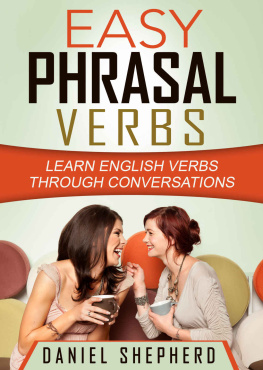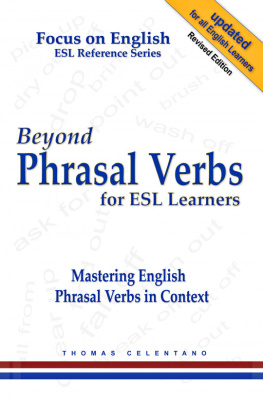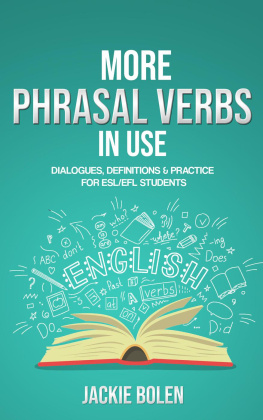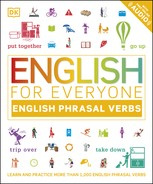Contents
Foreword
Welcome To This Book!
My name is Dan Shepherd and I was an English teacher in Japan from 1995 to 2009, where I ran a language school and taught students of all ages and from a wide variety of backgrounds. During my time in Japan, I realized that learners of English often find phrasal verbs difficult to use. When I looked for a good textbook to help my students, I found reference books on phrasal verbs, but I couldn t find any books showing how to use phrasal verbs in everyday conversation. I decided that one day I would write a book about phrasal verbs. This is that book. It is not a reference book there are many excellent ones already. Its goal is to give examples of phrasal verbs in conversation so that you can learn how to use them in daily life.
This book is the result of many years of experience and research. I have written over 450 original conversations based on 50 carefully selected meanings of common phrasal verbs. There are also over 200 exercise questions for you to test your understanding. I hope that you will find this book useful and, after reading it and doing the exercises, that you will feel more confident about using phrasal verbs.
Happy reading.
Dan Shepherd
Acknowledgements
I would like to thank Mark Wagland and Robin Pinkney for their invaluable assistance with proofreading and editing this book. Mark and Robin are both highly qualified English teachers who work at Westminster Kingsway College in London and their suggestions and feedback on the content of the book was both insightful and helpful. I would also like to thank my partner, Ben Indra, for his kind support and encouragement.
What Are Phrasal Verbs?
A phrasal verb is a combination of a verb like come, go, get, take, put, and look and a particle like to, in, out, from, back, and about. Adding the particle changes the original meaning of the verb.
For example:
get = obtain | I have to get some milk from the supermarket. |
get + to = arrive | We will get to London at 09:35. |
go = travel | I go to my office every morning. |
go + out = have a romantic relationship | I like to go out with handsome guys. |
Phrasal verbs are a very important part of English. Native English speakers often use phrasal verbs because they are short and efficient, so learning phrasal verbs can help you to understand what native speakers are saying. Most phrasal verbs are used in spoken and written English and can be used in both informal and formal situations, such as at work.
Transitive or Intransitive
Some phrasal verbs are transitive. This means the verb has an object.
For example:
I come fromRome.
In the example, Rome is the object of the transitive phrasal verb, come from.
Some phrasal verbs are intransitive. This means the verb does not have an object.
For example:
The taxi broke down on the way to the airport.
This happened to the taxi naturally, without anyones action. There is no object. In this example, broke down is an intransitive phrasal verb.
Separable or Nonseparable
Phrasal verbs are either separable or nonseparable. Unfortunately, there is no rule that will tell you if a phrasal verb is separable or nonseparable simply by looking at it. To help you, the phrasal verbs contained in this book are labelled, separable or nonseparable.
Nonseparable Phrasal Verbs
In nonseparable phrasal verbs, you cannot separate the verb and the particle.
This sentence is correct:
Subject | Verb | Particle | Object (Noun) |
They | come | from | Germany |
This sentence is wrong:
Subject | Verb | Object (Noun) | Particle |
They | come | Germany | from |
Separable Phrasal Verbs
In separable phrasal verbs, you can separate the verb and the particle.
Subject | Verb | Particle | Object (Noun) |
He | gave | back | the book |
Subject | Verb | Object (Noun) | Particle |
He | gave | the book | back |
Here gave and back are separated by the object, the book. Both sentences are correct.
If, however, the object is a pronoun like, me, you, her, him, it, us, them, the pronoun must be placed between the verb and the particle.
This sentence is correct:
Subject | Verb | Object (Noun) | Particle |
She | gave | it | back |
This sentence is wrong:
Subject | Verb | Particle | Object (Noun) |
She | gave | back | it |
Finally, if a separable phrasal verb has two objects, you have to separate the verb.
This sentence is correct:
Subject | Verb | Object 1 | Particle | Object 2 |
He | put | a tablecloth | on | the table |
This sentence is wrong:
Subject | Verb | Particle | Object 1 | Object 2 |
He | put | on | a tablecloth | the table |
Please go to my website for recommendations of good reference books about phrasal verbs and English grammar.
www.phrasalverbsexamples.com
1. Look at (1)
To move your eyes to see someone or something
Present | Continuous | Past | Present perfect |
look/looks at | be looking at | looked at | have/has looked at |
Nonseparable
Verbs of similar meaning:
view; glance at
1.1 look at (present tense)
1.1.1 Two friends are in the cafeteria at college.
A: Look at that. Todays special is beef stew.
B: Where does it say that?
A: Look at the menu in front of the counter.
B: Oh yeah. Hmmm I think Ill have the stew in that case.
1.1.2 Jenn and her friend are sitting on a bench in the shopping mall. While they are talking, Jenn sees a very cute guy walking past.
Jenn: Hey, isnt that the guy you met at the party last night?
Friend: Oh my God! Yes, it is. Dont look at him!
Jenn: Why not? I thought you liked him.
Friend: No, no. I talked with him at the party, but he was really weird so I spent all evening avoiding him. Dont look at him. Hell see us and come over.
Jenn: Ok, ok.
Next page










